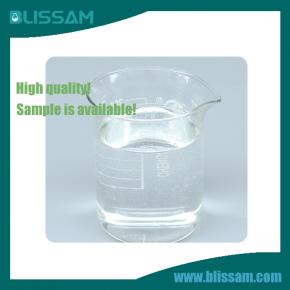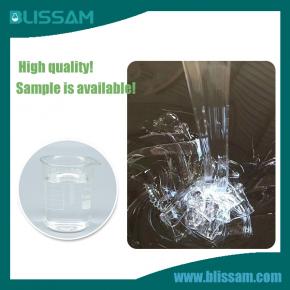Silicone fluids, also known as silicone oils or polydimethylsiloxane (PDMS), are a group of versatile synthetic oils that are derived from the silicone polymer. These fluids have gained widespread application in various industries due to their unique properties such as high thermal resistance, low surface tension, low viscosity, chemical inertness, and biocompatibility. In this article, we will delve into the difinition, types, and how to choose silicone fluids for your specific application.
Defining Silicone Fluids:
Silicone fluids are a class of silicon-based polymers that are formed by repeating units of siloxane chains. These fluids can be either non-volatile or volatile, depending on their molecular weight and structure. Non-volatile silicone fluids are high-molecular-weight oils that are pure liquids, while volatile silicone fluids are low-molecular-weight oils that have a tendency to evaporate at room temperature. The molecular structure of silicone fluids can be modified to achieve different viscosities, from low to high, depending on the application needs. They are also available in a wide range of formulations, including silicone copolymers and silicone additives, to enhance their performance in various applications.

Types of Silicone Fluids:
Silicone fluids can be broadly classified into two categories: non-volatile and volatile fluids. Let's take a closer look at each of these types and their applications. 1. Non-volatile Silicone Fluids Non-volatile silicone fluids, also known as polydimethylsiloxane (PDMS), are high-molecular-weight oils that have a wide range of applications due to their unique properties. This type of silicone fluid is chemically inert, nontoxic, non-flammable, and thermally stable, making it safe to use in various applications. PDMS fluids are available in various viscosities, from thin to thick, making them suitable for a wide range of applications. Some common types of non-volatile silicone fluids are: - Dimethyl fluid (DMF): This is the most basic and widely used silicone fluid. It has a low viscosity and is commonly used in personal care products, such as shampoos and conditioners, as well as in industrial lubricants. - Trisiloxane: This type of silicone fluid has a medium viscosity and is commonly used as a foam control agent in various personal care products, such as hair care and skincare products. - Cyclomethicone: This is a type of silicone fluid with a low viscosity and low surface tension, making it suitable for use as a spreading agent in personal care products. - Phenyl fluids (PMF): These are high-viscosity silicone fluids that are used as a thickening agent in personal care and cosmetic products. - Amino fluids: These silicone fluids have a reactive amino group that can bond with other molecules, making them suitable for use as a polymer modifier in coatings, adhesives, and sealants. Non-volatile silicone fluids find applications in various industries, including personal care, healthcare, automotive, and electronics, due to their desirable properties, such as lubrication, defoaming, and wetting. They are also used in metal processing, textiles, and food processing industries. 2. Volatile Silicone Fluids Volatile silicone fluids are low-molecular-weight oils that have a tendency to evaporate at room temperature, leaving no residue. They are commonly used as solvents or carriers for active ingredients in various cosmetic and personal care products, such as perfumes, hair sprays, and antiperspirants. Some common types of volatile silicone fluids are: - Octamethyltrisiloxane (MDM): This is a light, colorless, and odorless fluid that is commonly used as a solvent for hydrophobic materials and as a carrier for personal care products. - Decamethylcyclopentasiloxane (D5): This is a clear and odorless fluid that is widely used as a carrier in hair care products and as a solvent in personal care products. - Dodecamethylcyclohexasiloxane (D6): This is a low-viscosity silicone fluid that is used as a solvent or carrier in different personal care products, such as hair care, skincare, and antiperspirants. Volatile silicone fluids are also used in the pharmaceutical, textile, and automotive industries as solvents or carriers for various active ingredients. They are preferred over traditional solvents, such as alcohols and hydrocarbons, due to their low volatility and low surface tension.

How to Choose Silicone Fluids:
Choosing the right type of silicone fluid for your specific application can be challenging, given the wide range of options available. Here are some key factors to consider when selecting silicone fluids: 1. Viscosity The viscosity of a silicone fluid is an essential factor to consider when choosing one for your application. You need to determine the desired level of thickness or thinness of the fluid, depending on the application requirements. High-viscosity fluids are thicker and more suitable for applications that require cushioning, while low-viscosity fluids are thinner and suitable for applications that involve spreading or spraying. 2. Volatility The volatility of a silicone fluid is another important consideration. Depending on the application, you may need a fluid that is either non-volatile or volatile. For instance, in personal care products, volatile fluids are preferred to act as carriers or solvents for active ingredients, while non-volatile fluids are used for lubrication and defoaming. 3. Compatibility Compatibility with other substances is another crucial factor to consider when choosing silicone fluids. These fluids can react with certain materials, such as rubber and plastic, and cause swelling or degradation. Therefore, it is important to consider the compatibility of the fluid with the materials it will come into contact with in your application. 4. Thermal Stability Silicone fluids are known for their excellent thermal stability and can withstand extreme high or low temperatures. However, the degree of thermal stability varies among different grades of silicone fluids. Consider the temperature range of your application and choose a fluid that can withstand those conditions without losing its properties. 5. Regulatory Compliance When choosing silicone fluids for personal care or medical applications, it is important to ensure that they comply with relevant regulations and standards, such as FDA regulations and USP Class VI certification. This ensures the safety and biocompatibility of the fluid for use in these applications. silicone fluids are versatile materials that find applications in various industries due to their unique properties. When choosing silicone fluids, it is essential to consider factors such as viscosity, volatility, compatibility, thermal stability, and regulatory compliance to ensure the best performance in your specific application. With a wide range of formulations and grades available, there is a silicone fluid suitable for almost any application.
Contact:
Phone: +86-15957191858
E-mail: info@blissam.com
Whatsapp:+8615957191858
Add: A647, No. 9, Xiyuan Road, Xihu District, Hangzhou, Zhejiang, China
We chat
